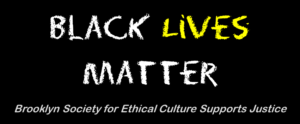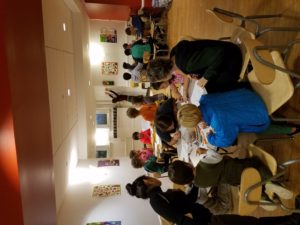
The Brooklyn Society for Ethical Culture is honored to display a banner asserting that Black Lives Matter. We strive to be an inclusive, freethinking community focused on social justice and personal growth. While we do not require that our members adhere to any religious or political belief, as a community we value the human worth of every person. So we must be committed to racial justice.
In particular, in displaying this banner, we stand in witness against state violence carried out disproportionately – as many studies have demonstrated –against people of color, against those of African descent. This disparity in the valuing of peoples’ lives is nothing new in American history. It is past time to be public witnesses to that injustice, and to call for change.
Racism, whether unconscious, conscious, or systemic, is a pervasive force in American culture today. We call for ending the disproportionate deaths caused by racism, and we call for ending the racial injustices that cause trauma and lessen opportunity.
As the BlackLivesMatter website says, “Black Lives Matter is an ideological and political intervention in a world where Black lives are systematically and intentionally targeted for demise. It is an affirmation of Black folks’ contributions to this society, our humanity, and our resilience in the face of deadly oppression.”
The Brooklyn Society for Ethical Culture is not, by displaying this banner, endorsing any particular platform or program or organization. We stand with those who share similar values and concerns.
Questions
If you have questions about the Society after reading this document, please contact our Clergy Leader, Jone Johnson Lewis, or Board President, Rebecca Lurie. You can find out how to contact them on our website at www.bsec.org.
A Community of Ethics
If you would like to join with us in a community of support for those who want to live in better relationship with others and the wider world, please check us out on a Sunday at 11 a.m. as we explore a variety of important ethical issues.
Answering Some Common Questions
Why not “All Lives Matter”?
If you believe – as we as an Ethical Society do – that everyone matters, then it’s simply a given that black lives must matter. We value black lives and recognize the disproportionate threat to black lives.
In advocating for change and compassion, people often focus on one cause, and there’s an implicit “too” because few would deny that other causes, other people, are also worthy of attention. If you don’t hear the implicit “too” after Black Lives Matter – yet do hear an implicit “too” when other causes are mentioned – then please examine your thoughts to see whether you include “black lives” in “all lives.”
In study after study, it’s found that African American, Latinx, and Native American people are treated by authorities with more deadly force, more often than are people identified as white, and that those authorities are held less accountable than when people identified as white are the targets of that force.
In the founding years of this nation, the same person could say “all men were created equal” and hold some men in bondage, not seeing them as created equal. The national anthem could be written with the words “land of the free” by a person who kept some people in bondage. “All lives matter” too easily has meant, in American history, only the lives of citizens identified as white.
Don’t “Blue Lives” matter?
We mourn if police officers lose their lives when they are carrying out their mission to serve and protect all of us. We particularly abhor such deaths as a result of ideology or hate. But the number of officers killed in the line of duty, while fluctuating a bit year to year, is generally declining. There are laws, policies, and practices protecting “blue lives” and making it highly unlikely that deadly violence against the police will escape consequences. So we don’t focus on the killings of police officers as a major social justice focus.
We call out the actions of those police officers who commit unjustified extrajudicial violence, we call out the system that protects such officers from responsibility for their acts, we call for change in a justice system which disproportionately incarcerates people of color, and we call out the racism of the larger society that devalues black lives. To say that these ideas are anti-police is an insult to the mission of the police force to serve and protect all people.
What about the violence at some demonstrations?
The “Black Lives Matter” movement has been and remains explicitly and strongly anti-violence. We, like those most involved with the Black Lives Matter movement, seek restorative, not retributive, justice. There are a few in any crowd who are angry and hurt and who don’t respect what the movement would prefer they do. The actions or words of that few do not speak for the many.
What does displaying the banner mean to the Brooklyn Society for Ethical Culture?
Displaying the banner does not mean we have endorsed every detail of every policy proposal or that we support every associated organization in the coalition for Black Lives Matter. Nor does displaying the matter bind individual members (or building users) in their personal beliefs and opinions. Many of our members support many of the proposals and organizations, and we think that even those ideas with which some members disagree are worth discussing as we consider what will end racial injustice and heal the long history of violence and trauma.
Hello friends and families,
We are excited to see you this Sunday at Ethics for Children! Read below for info about this weekend and other updates…
THIS WEEKEND!!!
There is a weekend full of local family events to check out, including EfC of course..read on below!
Saturday, 10/15/16: Join us at the 5th annual Permaculture Festival at Old Stone House. This is a really nice family-friendly fall event and a great way to learn about permaculture and sustainability. We are still in need of volunteers to help at our BSEC table, if you are available on Saturday morning or afternoon please let us know by filling the short form at: https://goo.gl/forms/wwNkPHA85MOcu8632 It is a fun opportunity to volunteer and meet others!
Sunday, 10/16/16: The weather is looking great for our Evolving/Living Ethics trip into Prospect Park with herbalist Teana David! We will leave BSEC shortly after 11 am and will be back on site by the end of platform (12:30). If you are running late, text me at 917-586-0130for our location. A reminder that this class will be filmed for a BRIC TV segment about Ethics for Children. A copy of the talent release form is attached if you are a parent of a child aged 8 and up and want to look at it before Sunday (no need to print it, we will have copies on hand for you to sign).
Herbalist and plant expert Teana David joins Living and Evolving Ethics to give us an introduction to plants, herbs and basic botany. Class will include a Plant ID walk in Prospect Park while Teana explains the plant’s medicinal uses (and whether or not they are edible) along with some historical and cultural context. We’ll end by making herbal vinegars, honey and infusion oils together.
After platform/classes, there will be a raising of a Black Lives Matter banner on the front of the building. This will include reading a poem; singing a song and a speaker. Kids are welcome to join their parents for this if interested.
AND, if you are looking for even more to do after EfC this Sunday, this free science event is happening close by:
CITY OF SCIENCE this Sunday, October 16 at Park Slope Armory YMCA. This family-friendly event is FREE and open to the public:
City of Science Brooklyn
Sunday, October 16th, 2016
10:00 AM–4:00 PM
Park Slope Armory YMCA
361 15th Street (btw 7th & 8th Ave)
Brooklyn, NY 11215
EMAILS
Starting next week, we will be using MailChimp to send EfC related emails. This email may initially get filtered into your “promotions” or “updates” folder on Gmail, so please look out for it by the end of next week. If it does get filtered, just drag it to the “Primary” tab and click “yes” when it asks: Do this for future messages? and Gmail will send it to your inbox going forward.
EfC REGISTRATION: Registration is available through our website. In the interest of our environment, registration will be exclusively done online. Here is the link: https://bsec.org/sign-up-for-ethics-for-children-classes/ Please complete your annual registration by the end of October.
Best,
Lea


 10-2-16 CLASS SUMMARY
10-2-16 CLASS SUMMARY